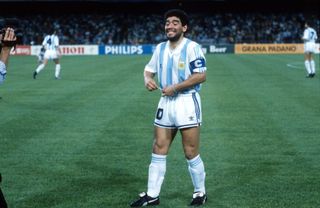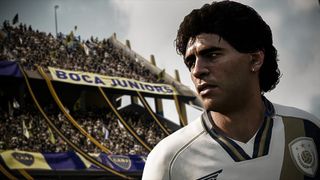FIFA 22 benches Maradona thanks to intractable rights dispute over his likeness
The late star's daughters and his former lawyer are locked in a bitter legal fight.

Football: the beautiful game and also, sadly, one of the grubbiest. So much money sloshes around at the top that corruption and scandal are as much a part of football's history as Italia 90. So to the news that the likeness of the late Diego Maradona, one of the all-time greats, has now been removed from EA's FIFA 22. The reason? An intractable licensing dispute over who has the rights to profit from him.
Start up FIFA 22 and you'll be greeted with this message:
"Due to a third party legal dispute, we must suspend Diego Maradona from appearing in FIFA Ultimate Team Packs, Ultimate Draft and the Soccer Aid World XI team.
"As such, Diego Maradona Icon Items will no longer be made available in Packs, SBCs and FUT Draft, and their price range has been fixed until further notice.
"We share our fans’ disappointment and hope to bring one of football’s greatest icons back in the game at some point in the future."
Last year an Argentinian court paved the way for this, ruling that EA had negotiated for the likeness rights with an individual who didn't hold them: Stefano Ceci, Maradona's former manager. But this is just part of a much larger legal battle, one that involves Maradona's children and a company called Sattvica that is co-owned by Maradona's former lawyer, Matias Morla.

Sattvica was founded in 2015, shortly after Maradona signed over his brand and likeness rights to Morla. Diego Maradona died in November 2020. After this Sattvica claimed it owned the rights to his brand and likeness, and has since been litigating worldwide to assert this claim.
The biggest gaming news, reviews and hardware deals
Keep up to date with the most important stories and the best deals, as picked by the PC Gamer team.
The back-and-forth is between Sattvica and Maradona’s daughters, Dalma Nerea Maradona Villafane and Dinorah Gianina Maradona Villafane. It has all been rather unsavoury. The sisters accused Morla of "betrayal, dishonesty, and abuse" in his management of the star's rights following his death. For his part, Morla said they "abandoned" their father and filed a complaint alleging digital bullying.
There have been various suits: the latest, filed in Florida earlier this year, accuses the pair of profiting off their father's name (as reported by IPTech).
The beautiful game. I give the context to emphasise that this situation may not be resolved for quite a while. As perhaps the greatest player in history, Maradona's brand rights are a goldmine and will presumably remain so for a long time to come: this legal battle will go all the way. And no matter how big FIFA the videogame is, or how much money it can throw around, you can't buy the rights until it's clear who owns them.
So the unthinkable has happened: Maradona's on the bench, and will remain so for a good while. It's all just rather sad, even if predictable, that the Golden Boy's death has been followed by such a scrabble over owning what he was in life.
As the videogame FIFA has become ever-more intertwined with the real-world sport over the last decade, so too has publisher EA had to deal with some of the unpleasant realities around real-world football: recent examples include removing a Manchester United player accused of rape, and removing Russian and Belarusian teams entirely following the war in Ukraine.
Rich is a games journalist with 15 years' experience, beginning his career on Edge magazine before working for a wide range of outlets, including Ars Technica, Eurogamer, GamesRadar+, Gamespot, the Guardian, IGN, the New Statesman, Polygon, and Vice. He was the editor of Kotaku UK, the UK arm of Kotaku, for three years before joining PC Gamer. He is the author of a Brief History of Video Games, a full history of the medium, which the Midwest Book Review described as "[a] must-read for serious minded game historians and curious video game connoisseurs alike."
Most Popular






